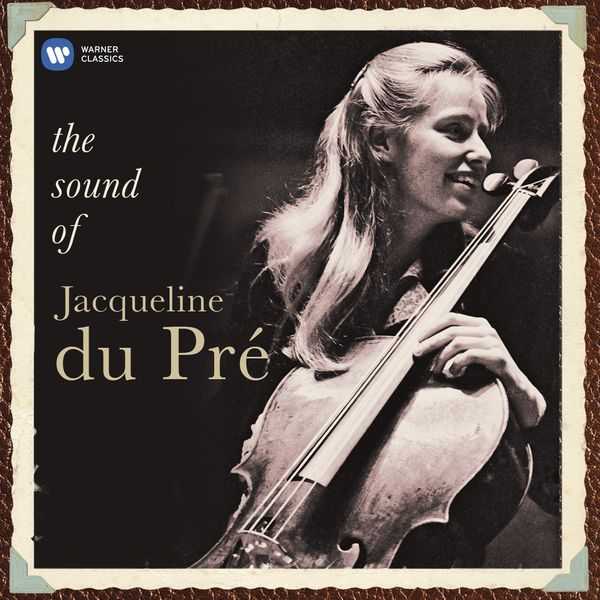
Composer: Johann Sebastian Bach, Ludwig van Beethoven, Luigi Boccherini, Johannes Brahms, Max Bruch, Frédéric François Chopin, Antonín Dvořák, Edward William Elgar, Manuel de Falla, Gabriel Urbain Fauré, César Auguste Franck, George Frideric Handel, Franz Joseph Haydn, Felix Mendelssohn, Matthias Georg Monn, Maria Theresia von Paradis, Charles Camille Saint-Saëns, Robert Schumann
Performer: Jacqueline du Pré, Valda Aveling, Ernest Lush, Pinchas Zukerman, Daniel Barenboim, Stephen Kovacevich, Roy Jesson, Gerald Moore, Osian Ellis, John Williams
Orchestra: London Symphony Orchestra, New Philharmonia Orchestra, English Chamber Orchestra, Chicago Symphony Orchestra
Conductor: Sir John Barbirolli, Daniel Barenboim
Number of Discs: 4
Format: FLAC (tracks)
Label: Warner
Catalogue: 0919752
Release: 2012
Size: 1.36 GB
Recovery: +3%
Scan: cover
CD 01
Elgar: Cello Concerto in E minor, Op. 85
01. 1st movement
02. II. Lento – Allegro molto
03. Adagio
04. IV. Allegro – Moderato – Allegro, ma non troppo
Saint-Saëns: Cello Concerto No. 1, Op. 33
05. I. Allegro non troppo –
06. II. Allegretto con moto –
07. III. Allegro non troppo
Schumann: Cello Concerto in A minor, Op. 129
08. I. Nicht zu schnell –
09. II. Langsam – Etwas lebhafter – Schneller –
10. III. Sehr lebhaft – (Cadenza) – Im Tempo – Schneller
CD 02
Haydn: Cello Concerto No. 1 in C major, Hob. VIIb:1
01. I. Moderato – Cadenza
02. II. Adagio – Cadenza
03. III. Allegro molto
Monn: Cello Concerto in G Minor
04. I. Allegro
05. II. Adagio
06. III. Allegro non tanto
Boccherini: Cello Concerto in B Flat
07. I. Allegro moderato – Cadenza
08. III. Finale (Allegro moderato)
CD 03
Handel: Sonata in G Minor
01. I. Grave
02. II. Allegro
03. III. Sarabande (Largo)
04. IV. Allegro
Beethoven: Piano Trio No. 5 in D Major, Op.70 No. 1 ‘Ghost’
05. I. Allegro vivace e con brio
Beethoven: Piano Trio in B-Flat Major, ‘Archduke’, Op. 97
06. I. Allegro moderato
Beethoven: Sonata for Cello and Piano No. 5 in D Op. 102 / 2
07. I. Allegro con brio
Chopin: Cello Sonata in G Minor, Op.65
08. IV. Finale (Allegro)
Franck: Sonata in A
09. I. Allegretto ben moderato
Brahms: Cello Sonata No. 1 In E Minor, Op. 38
10. I. Allegro non troppo
11. II. Allegretto quasi Menuetto
12. III. Allegro
CD 04
Bach: Cello Suite No. 1 in G major, BWV1007
01. I. Prélude
02. II. Allemande
03. II. Courante
04. IV. Sarabande
05. V. Menuets I & II
06. VI. Gigue
Bach: Toccata, Adagio & Fugue in C major, BWV564
07. Adagio
08. Paradis: Sicilienne
09. Beethoven: Variations on “Ein Mädchen oder Weibchen” for Cello and Piano, Op. 66
Schumann: Fantasiestücke, Op.73
10. I. Zart und mit Ausdruck
11. II. Lebhaft, leicht – Coda (Nach und nach ruhiger)
12. III. Rasch und mit Feuer – Coda (Schneller)
13. Mendelssohn: Song without Words for Cello & Piano, Op. 109
14. Saint-Saëns: Le carnaval des animaux: Le Cygne
15. Fauré: Élégie in C minor, Op. 24
16. Bruch: Kol Nidrei, Op. 47
Falla: Suite populaire espagnole
17. Jota
Jacqueline du Pré brought such searing intensity and radiant joy to her cello playing that her impact endures, despite a career that was radically and tragically curtailed by illness before she turned 30.
She was born in Oxford on 26 January 1945 into a middle-class family in which music was important: her mother was a fine pianist and a gifted teacher. Just before her fifth birthday, when she was already showing musical promise, she heard the sound of a cello on the radio and the course of her life was set. She studied at Herbert Walenn’s London Violoncello School and at ten became a pupil of William Pleeth, who had himself studied with Julius Klengel. In 1956 she was awarded the Suggia Gift; in 1959 she gave her first public performance of the Elgar Concerto; in 1960 she won the Queen’s Prize and in 1961 she made a successful London recital début. She studied briefly with Casals in Switzerland, Tortelier in Paris and Rostropovich in Moscow and gradually consolidated her reputation at home. She began recording for EMI in 1962 and by 1965, when her famous disc of the Elgar Concerto was made, she was a star. That year she made her American début and in 1967 she married the pianist and conductor Daniel Barenboim.
In July 1971, when she should have been at her peak, she began suffering seriously from a mysterious ailment which had already intermittently affected her playing. Eventually multiple sclerosis was diagnosed and, after a cruel series of remissions and relapses typical of that illness, in 1973 she retired. Gradually her health deteriorated, and she died in London on 19 October 1987.